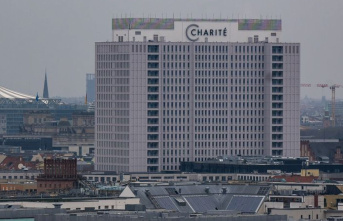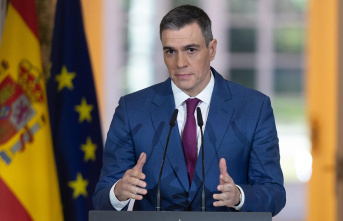The timing is macabre. Exactly 100 years after the fascists seized power under dictator Benito Mussolini, the ultra-right is back in government in Italy. With a woman at the helm, Giorgia Meloni, who once called Mussolini a "good politician". With Senate President Ignazio La Russa, number two in the state, who has pictures and a statue of the "Duce" in the living room. With top officials who proudly called themselves fascists.
Partisan groups, whose founders worked with the Allies to liberate the country from the fascist dictatorship in the resistance, are "extremely worried" about developments. Not just her.
Italy has forgotten and repressed a lot in a century. The rule of the fascists, which began with a coup d'état on a wet and cold weekend in the last days of October 1922, has been saved by many Italians as folklore and nostalgia. As if Mussolini's reign, which Hitler served as an example, had not been a historical evil, but just one epoch among many.
The reckoning failed
"We didn't settle accounts with fascism," criticizes Gianfranco Miro Gori from the Anpi partisan association. There was nothing similar to the Nuremberg trials in Italy. From 1945, the fascist functionaries were taken over by the post-war administration, in the courts, police stations and authorities. Fascist buildings still stand today. In Germany, traces of the Nazis were removed from public spaces after the end of the war - in Rome today, football fans pass an obelisk with the inscription "Mussolini Dux" (Mussolini leader) on their way to the Olympic Stadium. A relief of Mussolini as a general on horseback is clearly visible on an office building.
This is how Mussolini portrayed himself; he also wanted his seizure of power to be portrayed as heroic. The so-called "March on Rome", with which the fascist reign began between October 27 and 30, 1922, was much less spectacular.
While numerous fascist thugs occupied local administration buildings in northern Italy on October 27, several thousand supporters of Mussolini gathered in the rain outside the gates of Rome to attack the capital. The threat was enough, there was never a robbery. King Victor Emmanuel III. prohibited the army from taking action against the fascists and appointed Mussolini as head of government.
Night train to Rome
The fascist leader arrived in Rome on the night train on the morning of October 30th. As the new Prime Minister, he called on his now tens of thousands of supporters in the north and east of Rome to march into the Eternal City. There were immediately a number of raids on socialist and communist institutions. The country was turned into a dictatorship. In 1924 Mussolini won the elections by a landslide, two years later other parties were banned.
The "Duce", born in 1883 in modest circumstances, ruled over the Mediterranean country for around two decades. His henchmen spread fear and terror; Members of the opposition, minorities and Jews were persecuted, marginalized and then, during the Second World War, deported to concentration camps and killed.
After the Allies landed in Sicily in July 1943, Mussolini was deposed and arrested. German elite troops freed the dictator and wanted to help the Nazi allies regain power. This failed. On April 28, 1945, Mussolini was shot dead by partisans while escaping and hung upside down at a gas station in Piazzale Loreto, Milan.
glorification beyond death
But the glorification of fascism in Italy did not end with death. This can be seen, for example, in Mussolini's former place of residence Forlì. Domenico Morosini set up a small private museum there. The man who raises his right arm in greeting bought Mussolini's old villa and stuffed it with photos, busts, clothes and souvenirs. His wife proudly guides through the building, which is largely true to the original; Mussolini always calls them "il Duce," the leader. The Morosini's converted the top floor into a "study room" and painted "Duce" slogans on the walls. For the anniversary, they are planning some events at the site.
Half an hour's drive away, many admirers of Mussolini will come to his birthplace of Predappio on the occasion of the 100th anniversary of the "March on Rome". The small town has become a place of pilgrimage for Mussolini fans, fascists and neo-Nazis - from home and abroad. At the cemetery, the family crypt with the dictator's coffin can be visited, and people queue up in front of the entrance all year round.
Two processions take place: the partisan associations celebrate next Friday the anniversary of the liberation of the town by the Allies in 1944, which ironically also falls on October 28th in these autumn days. Two days later nostalgics commemorate the "March on Rome".
The souvenir shops on the main street of Predappio are bizarre. There you can buy flags, T-shirts, baby rompers, crockery and other souvenirs printed with fascist slogans, swastikas or SS runes. Statues of Hitler and Mussolini also line the shelves.
Closest confidante Melonis
A similar statue was shown to reporters in his living room four years ago by Senator Ignazio La Russa as part of a private collection of Mussolini memorabilia. He was recently elected chairman of the smaller parliamentary chamber, making him the second-highest office in the republic according to the constitution. During the election campaign he said that all Italians are "heirs of the Duce". He is one of Meloni's closest confidants at the far-right Fratelli d'Italia - in whose party crest a flame blazes, reminiscent of Mussolini's grave. Meloni recently emphasized that she was "proud" of it.
In her first government statement on Tuesday, she claimed that she "never felt any sympathy or closeness for anti-democratic regimes. For any regime, not even for fascism". The Fascists' racial laws, because of which the Jews in the country were harassed, persecuted and ultimately deported, she had "always considered the low point of Italian history, a disgrace that will mark our people forever".
But even a century after Mussolini's rise to power, the dark chapter has not been dealt with. When there was a recent uproar over whether photos of Mussolini should be taken down in ministry ancestral galleries, La Russa complained about "cancel culture." Italy proves that fascism will not disappear even 100 years after 1922 - quite the opposite.
Announcement Partisan Associations Memorial procession Partisans in Predappio












